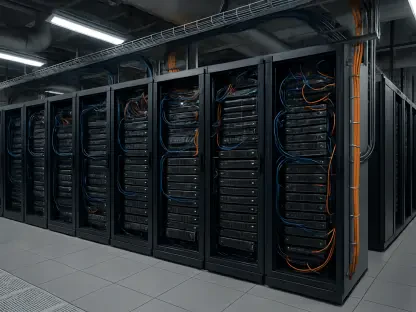In an era marked by rapid technological advancements, the landscape of artificial intelligence is experiencing unprecedented evolution. The increasing demand for scalable, secure, and decentralized infrastructure has brought about significant shifts in AI development approaches. Key among these shifts are the trends of AI sovereignty and AI reasoning, which are poised to reshape the future of decentralized intelligence. Yoram Novick, CEO of Zadara, highlighted these emerging trends at NVIDIA GTC, emphasizing the pressing need for organizations to adapt to these innovations to leverage AI’s full potential.
The Emergence of AI Sovereignty
Importance of Control Over AI Infrastructure
Organizations are increasingly prioritizing AI sovereignty to maintain autonomy over their data, infrastructure, and decision-making processes. This shift towards AI sovereignty is driven by various factors such as geopolitical considerations, regulatory compliance, and the need to reduce reliance on centralized providers. By investing in local AI infrastructure, businesses can ensure the security of sensitive data and adhere to regional regulations, thereby promoting operational independence.
Moreover, the deployment of edge AI solutions is a crucial component of AI sovereignty. Edge AI enhances performance by processing data closer to the source, reducing latency, and improving data privacy. This is particularly vital in sectors such as healthcare, finance, and government, where real-time decision-making and data security are paramount. As organizations embrace decentralized AI infrastructure, they can better manage their AI workloads, ensuring that sensitive information remains within their control.
Compliance and Data Security
One of the most compelling reasons for organizations to adopt AI sovereignty is the ability to comply with stringent data protection regulations. Laws such as the General Data Protection Regulation (GDPR) and other regional policies necessitate strict protocols for handling personal data. By housing AI infrastructure locally, companies can ensure compliance with these regulations, avoiding potential legal repercussions and safeguarding their reputation.
Additionally, local AI infrastructure investment mitigates the risk of data breaches and cyberattacks. Centralized systems are often prime targets for malicious actors, making decentralized systems more appealing due to their enhanced security measures. Organizations can implement robust security protocols tailored to their specific needs, reducing the likelihood of unauthorized access and data misuse. In this context, AI sovereignty is not just about operational control but also about building trust with clients and stakeholders.
Advancements in AI Reasoning
Real-time AI Decision-Making
AI reasoning represents the next frontier in AI inferencing, moving beyond the execution of pre-trained models to encompass real-time decision-making, contextual understanding, and problem-solving capabilities. For AI to achieve this level of sophistication, more computational power and a decentralized AI infrastructure are required. Decentralized platforms, as opposed to centralized environments used for AI training, support these advanced workloads by facilitating real-time decision-making closer to the end users.
The transition towards decentralized AI environments is critical for enhancing the responsiveness and adaptability of AI systems. Real-time decision-making necessitates low latency, which can be achieved through local processing at the edge. This approach enables AI systems to swiftly interpret and react to data, providing timely insights and actions. Consequently, sectors such as autonomous vehicles, smart cities, and disaster response can significantly benefit from the advancements in AI reasoning, leading to improved efficiency and safety.
AI Factories and Sovereign Cloud Platforms
The concept of AI factories and sovereign cloud platforms is gaining traction as organizations seek to harness the full potential of AI reasoning. AI factories are environments designed to support the development and deployment of AI workloads, offering the scalability and flexibility needed to manage complex inferencing tasks. These environments enable organizations to create and refine AI models, ensuring they are optimized for real-time applications.
Sovereign cloud platforms play a pivotal role in supporting decentralized AI infrastructure. They provide secure, scalable, and multi-tenant capabilities tailored to the needs of different organizations. By leveraging sovereign clouds, businesses can maintain control over their AI infrastructure while benefiting from the cloud’s scalability and flexibility. This approach ensures minimal latency and real-time adaptability, which are essential for effective AI reasoning. As the demand for decentralized AI grows, sovereign cloud providers are becoming integral in facilitating the development and deployment of advanced AI systems.
Decentralized AI Environments
Optimizing Compute Environments
The shift towards decentralized AI environments necessitates optimization of compute environments to support AI reasoning effectively. High-performance computing (HPC) environments are essential for managing the intensive computational demands of AI reasoning. These environments must be designed to handle large datasets, complex algorithms, and real-time processing requirements. By optimizing compute environments, organizations can ensure their AI systems are capable of delivering accurate and timely insights.
Moreover, decentralized architectures offer significant advantages over traditional centralized systems. They provide greater flexibility in resource allocation, enabling organizations to scale their AI infrastructure according to their specific needs. This scalability is crucial for managing the dynamic nature of AI workloads, ensuring that systems can adapt to changing requirements without compromising performance. By adopting decentralized architectures, businesses can achieve a balance between computational power, efficiency, and cost-effectiveness.
Secure, Scalable, and Multi-Tenant Capabilities
As AI reasoning becomes more prominent, the need for secure, scalable, and multi-tenant environments grows. Sovereign cloud providers are well-positioned to meet these requirements by offering tailored solutions that prioritize data security, compliance, and performance. These providers enable organizations to deploy AI infrastructure across various environments, including on-premises, edge, and hybrid setups, ensuring flexibility and control over their AI systems.
Security remains a top concern in decentralized AI environments. Sovereign cloud providers implement robust security measures to protect data integrity and privacy. These measures include encryption, access controls, and regular security audits to mitigate potential risks. Scalability is equally important, allowing organizations to expand their AI capabilities as their needs evolve. Multi-tenant capabilities ensure that resources can be efficiently shared among multiple users or applications, optimizing the use of available infrastructure.
The Path Forward for AI
Future Considerations for AI Development
The future of AI hinges on the successful integration of AI sovereignty and AI reasoning into decentralized environments. Organizations must prioritize the development and deployment of scalable and secure AI infrastructure to harness AI’s full potential. This involves embracing decentralized architectures that reduce reliance on centralized providers and enhance control over data and infrastructure.
AI sovereignty and reasoning are set to redefine how AI systems are developed and utilized. By focusing on real-time decision-making and contextual understanding, these trends will enable AI to become more responsive and adaptive to dynamic environments. As organizations continue to invest in AI, they must ensure that their infrastructure supports low-latency processing and real-time insights. This approach will be critical for industries that rely on timely and accurate data for decision-making.
Leveraging AI in the Decentralized Era
In an era defined by swift technological progress, the field of artificial intelligence is undergoing remarkable transformation. The rising need for scalable, secure, and decentralized infrastructure has led to noteworthy changes in AI development paradigms. Among these shifts, the concepts of AI sovereignty and AI reasoning stand out, set to revolutionize the future of distributed intelligence. Yoram Novick, CEO of Zadara, emphasized these cutting-edge trends during his presentation at NVIDIA GTC. He underscored the critical necessity for organizations to embrace these advancements in order to fully harness the potential of AI. As AI continues to evolve, the focus on decentralized and autonomous systems becomes increasingly crucial, presenting opportunities for enhanced security, privacy, and innovation. These advancements are not merely technical; they represent a fundamental shift in how AI systems are designed and deployed, necessitating a proactive approach from enterprises aiming to stay ahead in this rapidly changing landscape.









